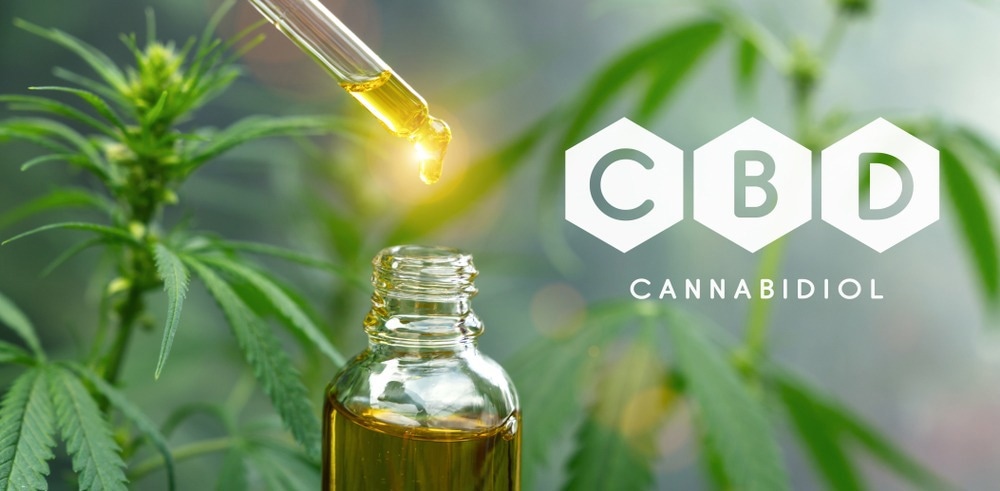The coronavirus disease 2019 (COVID-19), which is caused by infection with the severe acute respiratory syndrome coronavirus 2 (SARS-CoV-2), has caused over 6.4 million deaths to date.

Study: Cannabidiol As a Treatment for COVID-19 Symptoms? A Critical Review. Image Credit: r.classen / Shutterstock.com
Introduction
COVID-19 is associated with a wide spectrum of presentations from mild to life-threatening disease. The hyper-inflammatory reaction to SARS-CoV-2 is thought to be responsible for severe symptoms that involve multiple organ systems.
A wide range of drugs has been evaluated for their ability to mitigate COVID-19 severity. These includes dexamethasone, a powerful corticosteroid with anti-inflammatory and immunosuppressive activity; remdesivir, a nucleoside analog that inhibits viral replication; hydrochloroquine, an immunomodulatory antimalarial drug, convalescent plasma containing specific antibodies to the virus, as well as SARS-CoV-2 monoclonal antibodies.
Of these, only dexamethasone has shown an unequivocal improvement in the outcomes of a specified patient group. Notably, this steroid has not been evaluated for its utility in treating early COVID-19.
Meanwhile, remdesivir is useful only for hospitalized patients, with a relatively long treatment course that requires parenteral administration. Moreover, immunomodulators may have systemic effects.
Monoclonal antibodies are currently approved for use in patients with early disease who are at high risk for severe COVID-19.
Paxlovid and molnupiravir have been given emergency use authorization (EUA) for the treatment of high-risk COVID-19-positive patients. These agents are suitable only for those with early symptoms who are not receiving any other treatment for severe COVID-19.
The need for safe and effective early interventions has prompted investigations into potentially useful drugs for COVID-19. One of these is CBD, which acts on the endocannabinoid CB1 and CB2 receptors in the brain, as well as adenosine A2A receptors. These receptors are widespread in the human body.
CBD received approval in 2018 as an orphan drug for the treatment of one form of epilepsy. It is also known to have immunosuppressive and anti-inflammatory effects due to the expression of CB2 receptors in immune cells in the gut, lungs, and immune organs.
CBD in low doses may potentiate the intoxication caused by other cannabis metabolites, specifically tetrahydrocannabidiol (THC); however, it appears to counteract such effects at high doses. Importantly, CBD is not known to cause dependence or addiction.
Side effects of CBD include sleepiness, fever, poor appetite, abnormal behavior, and euphoria. Further research is needed to determine the relevance of these side effects following chronic use.
The current review summarizes current knowledge about CBD effects on COVID-19-related inflammation and respiratory symptoms from studies published between September and December 2020.
Study findings
Of the nine papers eligible for inclusion in the study, five were in vivo studies and three were in vitro studies using human tissues. None of the animal models had COVID-19; however, they were used to determine the effect of CBD on acute lung inflammation or injury, asthma, and acute respiratory distress syndrome (ARDS).
CBD was reported to decrease multiple inflammatory cytokines and reduce ARDS symptoms. Inflammatory infiltration of the lungs, as well as reduced protein exudation, inflammatory cytokine levels, and myeloperoxidase levels, were observed in response to CBD. Asthma-related inflammation was similarly reduced.
In the in vitro human tissue models, CBD treatment was associated with a lower expression of A2A receptors and reduced inflammation. As compared to dexamethasone, CBD reduced inflammatory signaling induced by lipopolysaccharide, which is a potent bacterial inflammation-inducing antigen
A single human randomized clinical trial (RCT) of CBD treatment in patients with mild to moderate COVID-19 was also available. To this end, no significant improvement was reported for CBD as compared to controls for the prevention of severe disease, reduced symptom duration, lower cytokine levels, reduced lung damage, hospitalization, or mortality. Psychological symptoms were also not different between groups.
A single open-label trial reported reduced burnout and emotional fatigue following treatment with CBD in frontline COVID-19 workers. However, 10% of the study participants reported serious adverse events, though all recovered completely.
In one recent study not included in the current review, researchers identify some indications of a replication-inhibitory effect of CBD on SARS-CoV-2 that is mediated by the endoplasmic reticulum. Data from the National COVID Cohort Collaborative database was cited, which showed lower rates of positive COVID-19 test results with CBD treatment.
Implications
While current evidence does not support the use of CBD in COVID-19 treatment, there remains an urgent need for more studies to be conducted. These should explore different dosage levels with CBD of a specified purity for prophylactic and therapeutic use, given the promising anti-inflammatory activity observed with this molecule in vitro.
Drug interactions also need to be explored, especially as COVID-19 treatment currently involves the use of many anti-inflammatory and immunomodulatory drugs.
Its anti-inflammatory properties could also be detrimental in suppressing the immune response, which might suppress the ability to fight off infections so that the risk might be higher for viral and respiratory infections.”
Taken together, there is inadequate evidence to support or reject CBD in COVID-19 treatment.
Journal reference:
- Holst, M. Nowak, D., & Hoch, E. (2022). Cannabidiol As a Treatment for COVID-19 Symptoms? A Critical Review. Cannabis and Cannabidiol Research. doi:10.1089/can.2021.0135.